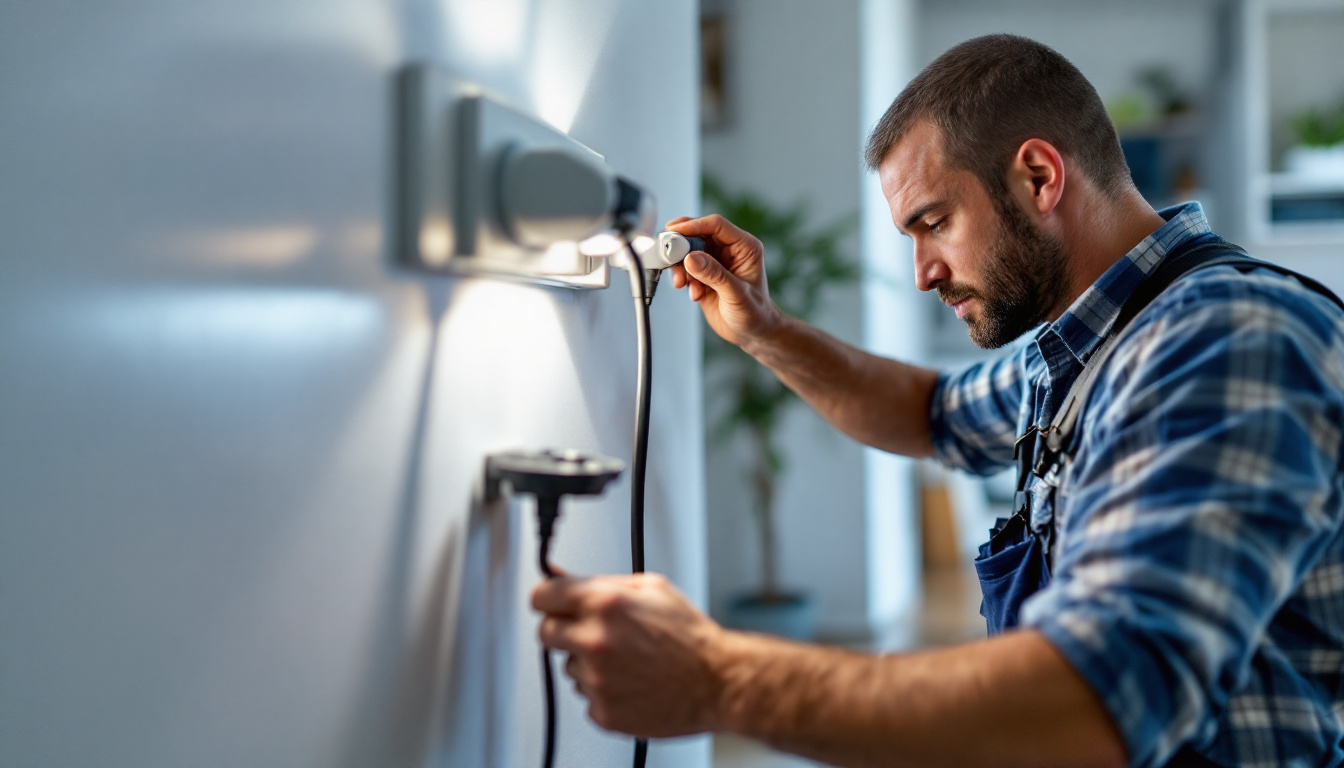

Lighting contractors play a crucial role in ensuring that residential, commercial, and industrial spaces are well-lit and aesthetically pleasing. One essential component that significantly impacts their work is the use of 120-volt plugs. These plugs are not just a standard in electrical systems; they are a vital tool that can enhance the efficiency and safety of lighting installations. This article delves into the importance of 120-volt plugs, their applications, and how they contribute to the success of lighting contractors.
120-volt plugs are commonly used in North America for various electrical devices, including lighting fixtures. They are designed to operate on a standard voltage supply, making them versatile and widely applicable in different settings. The significance of these plugs lies in their ability to provide a reliable power source, ensuring that lighting systems function optimally.
A 120-volt system is typically used for lighting and small appliances. It operates on alternating current (AC), which is the standard form of electricity supplied to homes and businesses. Understanding the basics of these systems is essential for lighting contractors, as it helps them design and install lighting solutions that are both effective and safe.
In addition to powering standard lighting fixtures, 120-volt systems can also support various accessories, such as dimmers and timers. This flexibility allows contractors to create customized lighting solutions that meet the specific needs of their clients. For instance, dimmers can enhance the ambiance of a room by allowing users to adjust the brightness according to their preferences, while timers can automate lighting schedules, improving energy efficiency and convenience.
There are several types of 120-volt plugs, each designed for different applications. The most common types include NEMA 1-15, NEMA 5-15, and NEMA 5-20 plugs. Understanding the differences between these plugs is crucial for contractors when selecting the appropriate type for their projects.
NEMA 1-15 plugs are ungrounded and typically used for low-power devices. In contrast, NEMA 5-15 plugs are grounded and widely used for most household appliances and lighting fixtures. NEMA 5-20 plugs, which can accept both 15-amp and 20-amp devices, are ideal for applications that require higher power levels. Additionally, the grounding feature in NEMA 5-15 and 5-20 plugs provides an extra layer of safety, reducing the risk of electrical shock and ensuring that devices are protected from power surges. Understanding the amperage ratings and the specific requirements of each device is essential for ensuring compatibility and safety in any electrical installation.
In lighting installations, 120-volt plugs serve multiple purposes. They not only provide power but also enhance the overall functionality and safety of lighting systems. Understanding their role can help lighting contractors make informed decisions when planning and executing projects.
One of the primary functions of 120-volt plugs is to deliver a consistent power supply to lighting fixtures. This reliability is crucial for ensuring that lights operate as intended, providing adequate illumination for various spaces. Moreover, using the appropriate plug type can enhance energy efficiency, reducing operational costs for clients.
Contractors who prioritize energy-efficient lighting solutions can leverage 120-volt plugs to integrate LED fixtures and smart lighting systems. These technologies not only consume less power but also offer features such as dimming and scheduling, further improving energy management. The integration of smart technology allows for remote control of lighting, enabling users to adjust settings based on their needs or preferences. This adaptability not only enhances user experience but also contributes to significant energy savings over time, making it a win-win for both contractors and clients.
Safety is paramount in any electrical installation, and 120-volt plugs are designed with this in mind. Grounded plugs, such as the NEMA 5-15, help prevent electrical shocks and reduce the risk of short circuits. For lighting contractors, understanding the safety features of these plugs is essential for compliance with electrical codes and standards.
Additionally, using high-quality plugs can minimize the risk of overheating and electrical failures. Contractors should always source plugs from reputable manufacturers to ensure they meet safety regulations and perform reliably in the field. Furthermore, it is advisable to conduct regular inspections and maintenance of lighting systems to identify any potential issues before they escalate. This proactive approach not only ensures the longevity of the lighting installations but also reinforces the safety of the environment in which they operate. By staying informed about the latest safety standards and technologies, contractors can provide peace of mind to their clients, knowing that their installations are both efficient and secure.
Lighting contractors encounter a variety of applications where 120-volt plugs are essential. From residential homes to commercial buildings, these plugs facilitate the installation and operation of diverse lighting systems.
In residential settings, 120-volt plugs are commonly used for indoor and outdoor lighting fixtures. They are ideal for standard ceiling lights, wall sconces, and landscape lighting. By utilizing these plugs, contractors can easily connect lighting fixtures to existing electrical systems, ensuring a seamless integration.
Moreover, the versatility of 120-volt plugs allows contractors to offer a range of lighting options, including decorative fixtures and energy-efficient LEDs. This flexibility can enhance the aesthetic appeal of homes while providing functional lighting solutions. For instance, dimmable LED bulbs can be paired with 120-volt plugs to create customizable lighting scenarios, allowing homeowners to adjust brightness according to their mood or activity. This adaptability not only improves the ambiance but also contributes to energy savings, making it a win-win for both contractors and homeowners.
In commercial environments, the demand for effective lighting solutions is even more pronounced. 120-volt plugs play a vital role in powering office lighting, retail displays, and industrial workspaces. Contractors must consider the specific lighting needs of each commercial project to ensure optimal illumination and energy efficiency.
For instance, in retail settings, proper lighting can significantly impact customer experience and sales. By utilizing 120-volt plugs, contractors can install adjustable lighting systems that highlight products and create an inviting atmosphere. Additionally, the use of smart lighting technology, which can be integrated with 120-volt systems, allows for dynamic control over lighting conditions. This can include features such as automated dimming or color-changing capabilities that respond to time of day or customer traffic, further enhancing the shopping experience and potentially increasing sales.
Temporary lighting setups for events, such as weddings, concerts, and festivals, often rely on 120-volt plugs. These plugs allow contractors to quickly and efficiently set up lighting systems that enhance the ambiance of any event. The portability and ease of use of 120-volt plugs make them a preferred choice for temporary installations.
Additionally, contractors can incorporate various lighting styles, such as uplighting, string lights, and spotlights, all powered by 120-volt plugs. This versatility enables them to create unique lighting designs that cater to the specific themes and requirements of each event. For example, at outdoor festivals, 120-volt plugs can be used to power colorful LED installations that not only illuminate pathways but also serve as artistic displays. The ability to easily connect and disconnect these systems allows for quick setup and teardown, making them ideal for events that require flexibility and creativity in lighting design.
Selecting the appropriate 120-volt plug is crucial for the success of lighting installations. Contractors must consider several factors to ensure they choose the right plug for each application.
The first step in choosing a 120-volt plug is to assess the power requirements of the lighting fixtures being installed. Different fixtures have varying wattage needs, and selecting a plug that can handle the load is essential for safety and performance.
Contractors should also consider the total wattage of all connected fixtures to avoid overloading the circuit. This assessment will help ensure that the lighting system operates efficiently and reduces the risk of electrical issues.
Another critical factor is compatibility with existing electrical systems. Contractors must ensure that the chosen 120-volt plug is compatible with the outlets and wiring in the installation area. This compatibility will facilitate a smoother installation process and minimize potential issues down the line.
In cases where existing systems do not support the desired plug type, contractors may need to make modifications or upgrades to the electrical infrastructure. This consideration is essential for ensuring that the lighting system functions as intended.
Proper installation of 120-volt plugs is vital for ensuring safety and functionality. Lighting contractors should adhere to best practices to guarantee successful installations.
Compliance with local electrical codes and standards is paramount in any electrical installation. Contractors should familiarize themselves with the regulations governing 120-volt systems to ensure that their work meets safety requirements.
Failure to comply with these regulations can result in safety hazards, legal issues, and costly rework. Therefore, staying informed about current codes is essential for lighting contractors.
After installation, thorough testing of the lighting system is crucial. Contractors should check all connections, ensuring that plugs are securely attached and functioning correctly. This testing process helps identify any potential issues before the system is put into regular use.
Additionally, conducting load tests can help verify that the system can handle the power requirements of connected fixtures. This step is essential for ensuring the longevity and reliability of the lighting installation.
In the ever-evolving world of lighting design and installation, 120-volt plugs remain a cornerstone for lighting contractors. Their versatility, safety features, and compatibility with various lighting systems make them indispensable in both residential and commercial projects. By understanding the importance of these plugs and adhering to best practices, lighting contractors can enhance their efficiency, ensure safety, and ultimately contribute to the success of their projects.
As the demand for innovative lighting solutions continues to grow, the role of 120-volt plugs will undoubtedly remain vital. By leveraging their benefits, contractors can not only meet client expectations but also elevate their own standards of excellence in the lighting industry.
Ready to take your lighting projects to the next level? At LumenWholesale, we provide lighting contractors like you with the highest quality 120-volt plugs and spec-grade lighting products at unbeatable wholesale prices. Say goodbye to local distributor markups and hello to our extensive selection that meets the highest industry standards for reliability and performance. Plus, with free shipping on bulk orders, you can stock up on premium lighting solutions at the best value — without any hidden fees. Elevate your lighting installations today and experience the perfect blend of quality, affordability, and convenience. Visit LumenWholesale for Wholesale Lighting at the Best Value.
Discover how outdoor home lighting fixtures are revolutionizing the lighting industry, offering contractors innovative solutions to enhance aesthetics, improve energy efficiency, and elevate outdoor spaces.

Discover the essential compliance guidelines for outdoor LED lamps that every lighting contractor must know.

Discover the essential guide for lighting contractors on wall sconces, exploring design trends, installation tips, and the latest innovations to enhance any space with style and functionality..

Explore essential insights for lighting contractors on dusk to dawn lights, including installation tips, energy efficiency benefits, and the latest technological advancements to enhance outdoor illumination projects..
Get notified when NEW deals are released.
Optimize your budget with wholesale discounts.
Only top-quality, specification-grade lighting products.
No additional costs at checkout - what you see is what you pay.
We understand the unique needs of contractors.